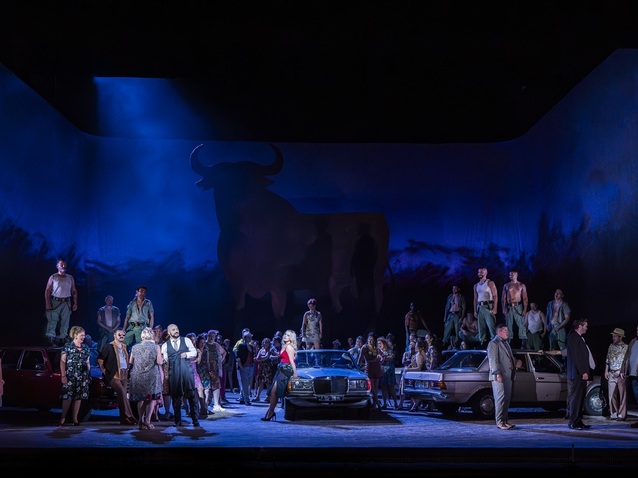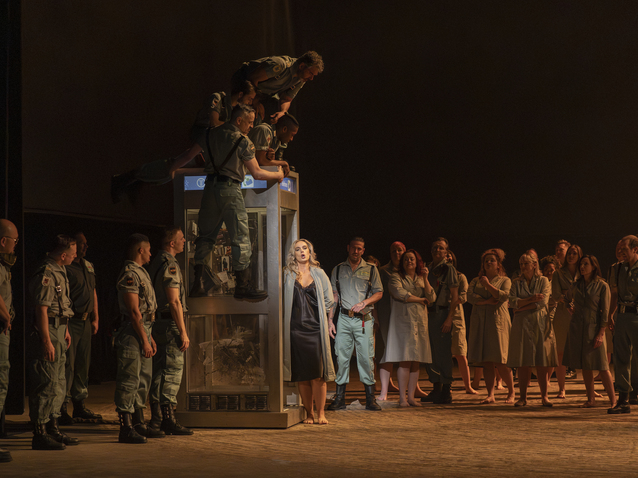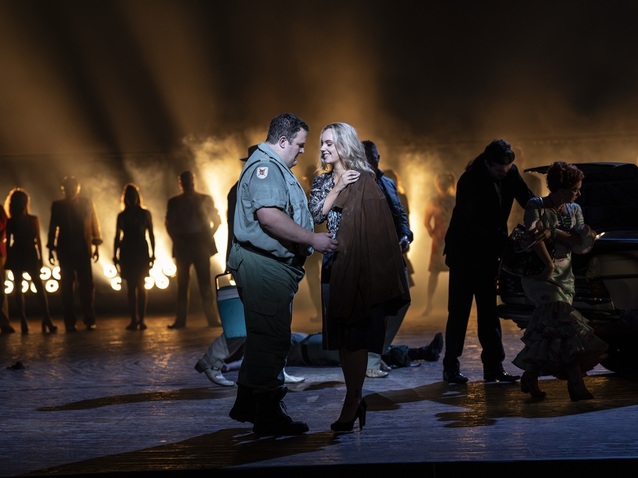 © Ellie Kurttz
© Ellie Kurttz
Based on Prosper Mérimée’s eponymous novella, Georges Bizet’s Carmen of 1875, with a libretto by Ludovic Halévy and Henri Meilhac, is the story of the ultimate temptress. A gypsy and cigarette factory worker in Seville, Carmen has the power to entice any man she chooses. Once they are besotted with her, however, she quickly moves on, leaving them heart broken and unable to accept what has happened.
In the opera Don José, an army corporal, has almost everything he could ever desire. He has the sweet, loving Micaëla who is more than willing to marry him, a job he is proud of, and every opportunity to remain close, both physically and metaphorically, to his mother and home village. In spite of this, when Carmen decides that she likes him, he ends up sacrificing everything he has for her, and cannot accept it when she loses interest in him and turns to the torero Escamillo.
If Carmen hardly sounds a sympathetic character, she can certainly engage an audience with her allure and steadfast determination to live by her own rules. Freedom is the most important thing to her so that when Don José threatens to kill her unless she says that she loves him, she accepts her fate, preferring death to proclaiming a lie and feeling a sense of imprisonment.

The Cast of ENO’s Carmen 2025 © Ellie Kurttz
Calixto Bieito’s staging for English National Opera, which represents a co-production with Den Norske Opera and Ballet, first appeared at the London Coliseum in 2012. It now enjoys its fifth outing there, with Jamie Manton as the revival director. Bieito transports the action to the dying days of Franco’s regime in the 1970s, and this has quite an impact on how the opera comes across. Witnessing the men’s treatment of the women feels even more shocking in a setting that is in some audience members’ living memory, as opposed to two hundred years ago. If that is disconcerting to begin with, this production takes additional steps to feel stark. The action occurs on a virtually bare stage, on which designer Alfons Flores often inserts objects, and seems significantly more violent than usual. When the soldiers come on to Micaëla as she searches for Don José, their behaviour is extremely threatening and cannot be dismissed simply as reflecting high spirits or lively banter. When the women take sides over whether Carmen or Manuelita was to blame for the fight between the pair, they end up brawling themselves, while after Carmen’s escape Manuelita is hoisted high up a flagpole, presumably as a punishment for her own part in the disturbance.
To present such a hard hitting version of events is reasonable, and makes for some very powerful moments. However, some of the banging on cars and telephone boxes proves to be counterproductive as it emphasises the brutality, but breaks the overall rhythm of the opera. In particular, the spell of Carmen’s seductive ‘Je vais danser en votre honneur’ is broken the moment we hear her hand slamming down on a car.

John Findon, Niamh O'Sullivan, ENO’s Carmen 2025 © Ellie Kurttz
All four main principals are strong, but their portrayals of the characters are affected by the overall set-up. This is a production in which everything feels so forthright that there is little sense of temptation and allure bubbling beneath the surface, and Niamh O’Sullivan’s interpretation of Carmen reflects this. She reveals a beautifully rich mezzo-soprano, but her confidence that any man will fall for her manifests itself as straight forward cockiness, so there is less subtlety than if she had projected herself more as an ‘ice queen’. John Findon is an excellent Don José, who from the moment he first sees Carmen reveals the nervousness and awkwardness that derives from his instant attraction to her. His tenor is brilliantly expansive and his immensely powerful performance will live long in the memory.
It is illustrative of both the nature of, and problem with, the production that it is difficult to engage with Don José’s own feelings in ‘La fleur que tu m’avais jetée’ because he has just hit Carmen so forcefully that we hear the slap. Once we get over this, however, the remainder of Act II is highly compelling as both Findon and O’Sullivan’s performances are extremely convincing. We find ourselves believing that Carmen will love Don José forever, and forgetting that she is willing for him to sacrifice his entire career simply to fulfil her immediate desires. The ending to Act IV is also quite overwhelming by virtue of how well this pair work together.
Cory McGee asserts a firm and persuasive bass-baritone as Escamillo. The impact of his ‘Votre toast, je peux vous le rendre’, however, is undermined by the production demanding him to appear in a slightly drunken and disheveled state when we need to see the proud and upstanding torero in every way. In Act IV we witness exactly that as he is decked out in all his finery, and this is the point at which his performance really shines. Ava Dodd as Micaëla reveals a sweet but sufficiently strong and very well shaped soprano, and we genuinely believe that she would have the courage to enter a smugglers’ den to rescue the man she loves. Clelia Cafiero and Olivia Clarke share conducting duties over the run, and Cafiero’s conducting, in being taut, bold and assertive, complements the nature of the production as well.
By Sam Smith
Carmen | 8 October - 5 November 2025 | London Coliseum
the 13 of October, 2025 | Print
Comments